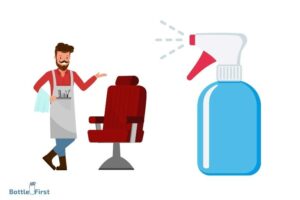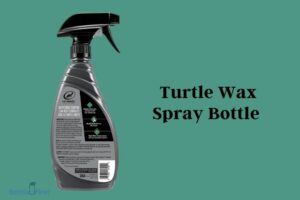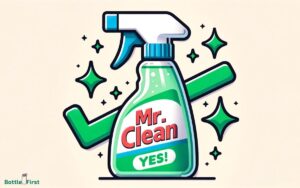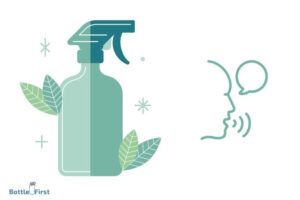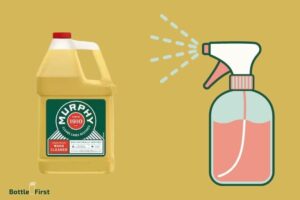What Do Tattoo Artist Use in the Spray Bottle? Solutions!
Tattoo artists typically use a diluted solution of green soap or an antimicrobial/antibacterial product in their spray bottles.
This solution is used to clean the skin before, during, and after the tattooing process to maintain hygiene and prevent infection.
The contents of the spray bottle used by tattoo artists are essential for several reasons:
- Pre-Tattoo Preparation: Before tattooing, the artist cleans the skin to remove any bacteria, dirt, or oils.
- During Tattooing: The solution helps to wipe away excess ink, and blood, and to keep the skin clean.
- Aftercare: Cleaning the finished tattoo can reduce the risk of infection and aid in the healing process.
The most common solutions found in a tattoo artist’s spray bottle include:
- Green Soap: A vegetable oil-based liquid soap that is environmentally friendly and effective for cleaning.
- Diluted Antimicrobial or Antibacterial Solutions: These are sometimes used instead of or in conjunction with green soap to ensure a sterile environment.
To ensure a sterile environment, tattoo artists rely on their spray bottle solutions for optimal skin preparation and aftercare.
In the realm of tattoo artistry, a spray bottle is a vital tool containing a specialized cleaning solution, often a mix of green soap or an antimicrobial agent, used for prepping and maintaining the cleanliness of the skin throughout the tattoo process.
This practice is integral to both the safety and quality of the tattoo, aiding in infection prevention and ensuring the best possible outcome for the artwork.
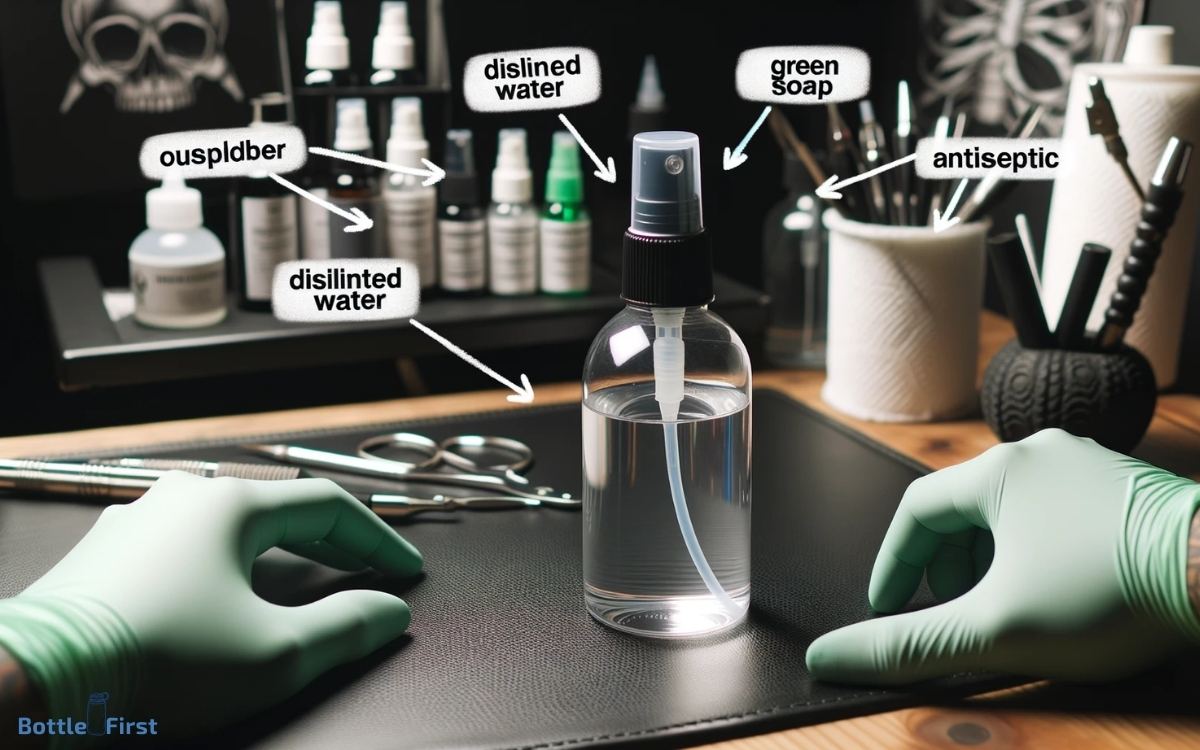
Key Takeaway
The Purpose of the Spray Bottle
In your tattooing process, the spray bottle is used to maintain a clean and sterile working environment. It helps to disinfect the skin before the tattooing begins, reducing the risk of infections.
The spray bottle also contains a mixture of water and medical-grade soap which is used to clean the tattooed area during the process.
This ensures that any excess ink or blood is gently removed, allowing the tattoo artist to have a clear view of the design and making it easier to work.
Additionally, the spray bottle is used to keep the skin hydrated and reduce redness and irritation during and after the tattooing process.
Overall, the spray bottle is an essential tool for maintaining hygiene and ensuring a smooth and successful tattooing experience.
When it comes to tattooing solutions, there are several common ingredients that artists use to create their tattooing mixtures.
Common Ingredients in Tattooing Solutions
Tattoo artists use a variety of common ingredients to create their tattooing solutions. These ingredients are carefully selected to ensure the best results for your tattoo.
Some common ingredients include:
- Purified water: Provides a clean base for the solution, ensuring that it’s safe for use on your skin.
- Glycerin: Helps to keep the skin moisturized during the tattooing process, reducing irritation and promoting better healing.
- Witch hazel: Acts as a natural astringent, soothing the skin and reducing redness and inflammation.
Understanding the ingredients used in tattooing solutions can help you feel more connected to the process and ensure that you’re comfortable with what’s being applied to your skin.
Now, let’s delve into the crucial topic of sterilization and hygiene practices.
Sterilization and Hygiene Practices
To ensure the safety and cleanliness of the tattooing process, tattoo artists rely on strict sterilization and hygiene practices.
Before beginning a tattoo, artists thoroughly wash their hands with antibacterial soap and put on disposable gloves.
They also sterilize the tattooing equipment using an autoclave, which uses steam and pressure to kill any bacteria or microorganisms.
Additionally, single-use disposable needles and tubes are used for each client to prevent any chance of cross-contamination.
The work area and all surfaces are meticulously cleaned and disinfected between clients. High standards of cleanliness not only protect you, the client, but also the artists themselves.
Role of the Spray Bottle in Tattoo Aftercare
After completing the tattoo, the artist typically uses a spray bottle to apply a thin layer of antiseptic solution or saline to keep the tattooed area clean and aid in the healing process.
The spray bottle plays a crucial role in your tattoo aftercare, providing gentle and consistent hydration to the freshly tattooed skin. This helps to minimize scabbing and itching, promoting a smoother healing process.
Additionally, the mist from the spray bottle can offer a soothing sensation, providing relief from any discomfort or irritation.
Moreover, the act of lightly misting the tattooed area can create a sense of mindfulness and care, allowing you to feel connected to the healing process and fostering a sense of pride in your new ink.
Specialized Solutions for Different Tattooing Stages
During the tattooing process, tattoo artists use specialized solutions in the spray bottle to aid in different stages of healing and aftercare.
Before tattooing, a pre-tattoo solution is used to cleanse the skin and prepare it for the procedure. This solution helps to remove any oils or dirt that could interfere with the tattooing process.
During the tattooing process, a combination of water and specialized solutions is used to keep the skin moist and to help with ink saturation.
Once the tattoo is complete, a post-tattoo solution is used to clean the area and prevent infection. This solution also helps to soothe the skin and promote healing.
These specialized solutions play a crucial role in ensuring proper healing and maintaining the vibrancy of the tattoo.
Conclusion
So next time you see a tattoo artist with a spray bottle, you’ll know that they’re using a carefully crafted solution to ensure the best outcome for your tattoo.
Like an artist with their paintbrush, the spray bottle is an essential tool in creating a masterpiece on your skin.
It’s not just water in that bottle; it’s a key ingredient in the artistry of tattooing.

